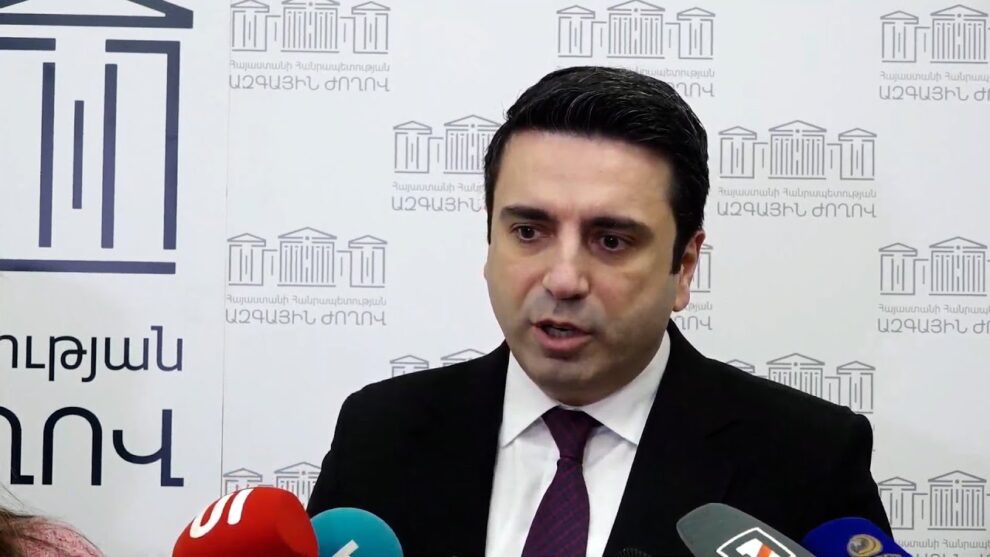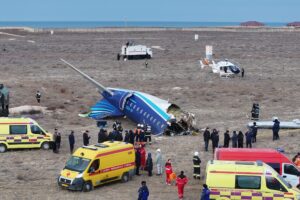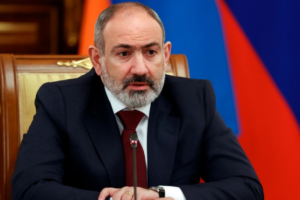The V Eurasian Research on Modern China and Eurasia Conference, organized by the China-Eurasia Council for Political and Strategic Research foundation, started Friday in Armenia’s capital of Yerevan.
The Minister of Labor and Social Affairs of Armenia, Narek Mkrtchyan, made opening remarks, stating as follows: “This conference is unique in terms of geopolitical and economic developments occurring in the Eurasian region. Today, the discourse about China revolves around the One Belt One Road [(Belt and Road)] Initiative. 151 memorandums of understanding have been signed with various countries of the world within the framework of the initiative. Armenia was one of the first countries to support the initiative.
In the context of the ongoing geopolitical changes, China’s economy occupies a central position. These developments are due, first of all, to technological progress, especially the development of digital and information solutions.
Also, the technological era creates a model of military-technical cooperation. We need to think about new ideas, such as cyber governance or international cyber norms.
Since the years of independence, Armenia and China have cooperated in various domains. Social protection is a new domain of cooperation. Although China is a big country, Armenia is small, sometimes both face the same challenges.” The minister spoke also about Armenia’s “Crossroads of Peace” project, and underscored it.
“The model of the ‘Crossroads of Peace’ project includes not only the security dimension, but also communication, economic cooperation, and cultural exchange. It makes Armenia an important player in the Eurasian region. This project is in line with the One Belt One Road Initiative. It is not only a priority for Armenia’s security, but also has a regional and transformative effect. The project gives the small countries of the region an opportunity to have an impact on the establishment of communications in the Eurasian region,” emphasized Narek Mkrtchyan.
Chinese Ambassador to Armenia Yong Fan also made opening remarks. “The One Belt One Road Initiative originated in China, but its success depends on many countries around the world. Cooperation has been established with various countries on five continents and more than 30 international organizations.
Armenia is one of the first countries to respond to the initiative and participates in joint construction projects. Trade between China and Armenia has increased significantly. In the last year alone, it increased by 30%, reaching 1.5 billion US dollars.
More than 20 Armenian organizations participated in the recently held import-export forum in Shanghai. Major infrastructure projects, such as the construction of the North-South road, are being implemented in Armenia, with the participation of China.
Overcoming language barriers and cultural exchange also play an important role in the development of relations. From this point of view, the Armenian-Chinese friendship school has made an important contribution to the development of interpersonal contacts.
Continuous cooperation is established also between various cities and regions. China’s efforts are aimed at creating a more inclusive, green, and beautiful world where there is stable peace, security, and prosperity,” the Chinese ambassador stressed.
The supporter of the V Eurasian Research on Modern China and Eurasia Conference is the Embassy of the People’s Republic of China in Armenia. Ambassadors, scholars, and politicians from 20 countries are attending this event, during which 44 scholars and diplomats will speak.
Among the aforesaid are Yong Fan, Ambassador Extraordinary and Plenipotentiary of the People’s Republic of China to the Republic of Armenia; Heinz Gärtner, Chair, Advisory Committee for Strategy and Security Policy of the Scientific Commission at the Austrian Armed Forces, Chair, Advisory Board, International Institute for Peace; Professor, University of Vienna, Austria; Wei Zheng, Minister-Counsellor of the Ministry of Foreign Affairs of the People’s Republic of China, Secretary-General of the Good-Neighborliness, Friendship and Cooperation Commission of the Shanghai Cooperation Organization; Gohar Barseghyan, Director, Integration Development Department in the Eurasian Economic Commission, Eurasian Economic Union; Dr. Narayanappa Janardhan, Director of Research and Analysis, Anwar Gargash Diplomatic Academy, UAE; Dr. Mher Sahakyan, Director, China-Eurasia Council for Political and Strategic Research, Armenia; Dr. David Morris, Senior Fellow, Center for China and Globalization, Senior Research Fellow, Beijing Foreign Studies University, Director, David Morris Projects OÜ; and Dr. Alexander Korolev, Deputy Head, Centre for Comprehensive European and International Studies, National Research University Higher School of Economics, Russia.
Ambassadors of Kazakhstan, Serbia, Syria, diplomats from Canada, France, Russia, and several other embassies in Armenia have confirmed their participation as special guests.
The China-Eurasia Council for Political and Strategic Research has organized four international academic conferences on this topic. This conference shall unite a new international team for the publication of a manual on international relations between China and Eurasia at the prestigious Routledge publishing house. Such an experience has already taken place in previous years. As a result of the 2018-2019 conferences, the book “China and Eurasia: Rethinking Cooperation and Contradictions in the Era of Changing World Order” was published. And as a result of the 2021 conference, the book “China and Eurasian Powers in a Multipolar World Order 2.0″ was published. And in 2023, the book “Security, Diplomacy, Economy and Cyberspace” was published. Both books were published by the prestigious Routledge publishing house.
Source: NEWS.am





